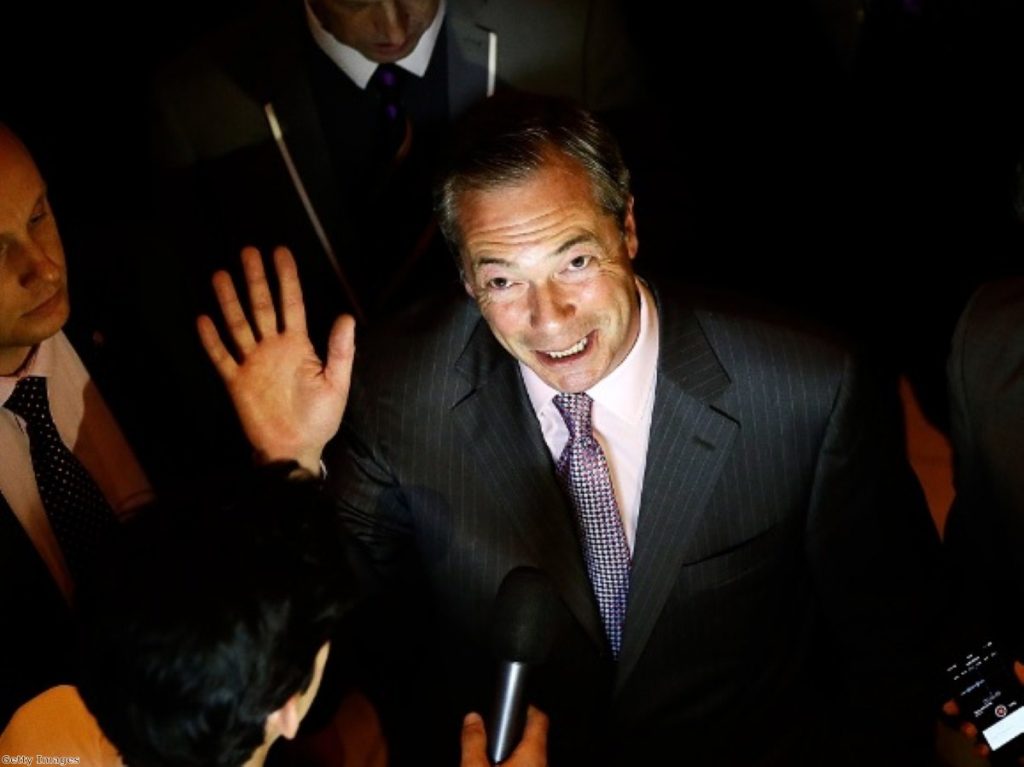Farage’s triumph: Voters flock to Ukip as Europe turns right
Nigel Farage's Ukip has confounded his critics by winning the European parliamentary elections outright, in the biggest rejection of mainstream politics by British voters in modern times.
With all of the results in Ukip won 24 MEPs and 27.5% of votes, up 11% on its 2009 record.
Labour were up ten points to 25%, with the Conservatives down four per cent to 24%.
Ukip made its first gain in the north-east region, where a 14% bump to 29% saw it take one of the region's three MEPs. In the north-west it made two gains from a 12% increase.


In the eastern region Ukip took 35% of the vote, up 15%, handing them three seats. It earned a second seat in the East Midlands with a 16% increase to 33%. Ukip won three seats in Yorkshire and Humber, up two from 2009.
For much of results night the final result looked even starker, but an impressive win for Labour – which gained two MEPs and gained 15% of the vote, compared to Ukip's six per cent increase – helped narrow the gap.
Farage said the elections were "an earthquake because never before in the history of British politics has a party seen to be an insurgent party ever topped the polls in a national election".
He later suggested Ukip could replace the Liberal Democrats as the kingmakers of Westminster politics, raising the possibility that the party could end up determining who becomes prime minister next year.
"Who's to say in a year's time what Ukip can and cannot achieve in a general election?" he said.
"It is not completely beyond the bounds of possibility that we can hold the balance of power in what is likely to be a hung parliament… all I can say is we go on surprising people."
Among the local authorities registering strong Ukip swings was Newark and Sherwood, which saw European results putting Labour in second place. A repeat of that result in next month's by-election would see Roger Helmer elected as the first Ukip MP in the current parliament.
The national result, much feared in Westminster but denied by many until tonight, is calamitous for all the main parties.
But, despite the London boost, it is Labour supporters who face the biggest disappointment. This was the first time the main party of opposition in the Commons failed to come first in European elections since 1984.
It has already prompted one unnamed shadow minister to declare to the Independent on Sunday newspaper that party leader Ed Miliband is "damaged goods" who is "not a prime minister".
Conservative spinners pointed out Labour were struggling to break through in many of the target seats which will decide next year's general election.
William Hague said the Tories, who were slipping around four per cent nationally, would not face a comparable Ukip threat next year.
"People use different elections to send different messages," he said.
"In the general election it will be only the Conservative party that can give people a choice on Europe."
The Liberal Democrats suffered a terrible night, coming fifth in Sheffield where Nick Clegg is an MP. Party president Tim Farron conceded the Lib Dems could lose all their MEPs – but Catherine Bearder held a Lib Dem seat in the south-east by a slim margin.
Bill Newton-Dunn, the first of the party's MEPs to lose their seat, told Sky News: "The real problem is we haven't got the public engaged or interested at all and that's a problem for democracy."
But the wave of leadership speculation which dogged the party over a difficult weekend appears to be being allayed by senior figures in the party backing Clegg.
The Green party took a seat from the Lib Dems in the liberal stronghold of the south-west, where Molly Scott Cato pushed out Graeme Watson with 11% of the vote. In the south-east the Greens picked up a second MEP.
In Scotland the SNP held its vote share in 2009 but did not make significant gains, while both Labour and the Ukip advanced by five per cent.
On the continent, the night was dominated by the shock victory of the extremist Front National in France.
Marine Le Pen's party took 25%, giving them the win, and leaving French prime minister Manuel Valls lamenting a "political earthquake" which pundits quickly noted would be damaging for reports of Farage's own triumph.
The radical leftist Syriza party triumphed in Greece and in Denmark the far-right Danish People's party came first. But in Germany chancellor Angela Merkel's CDU held on as the biggest party. In Britain the BNP lost both its MEPs, including party leader Nick Griffin.
Overall turnout in Britain was 36%. This was an increase of 1.5% on 2009's elections, but was slightly below the average across the European Union of 43.1%.

